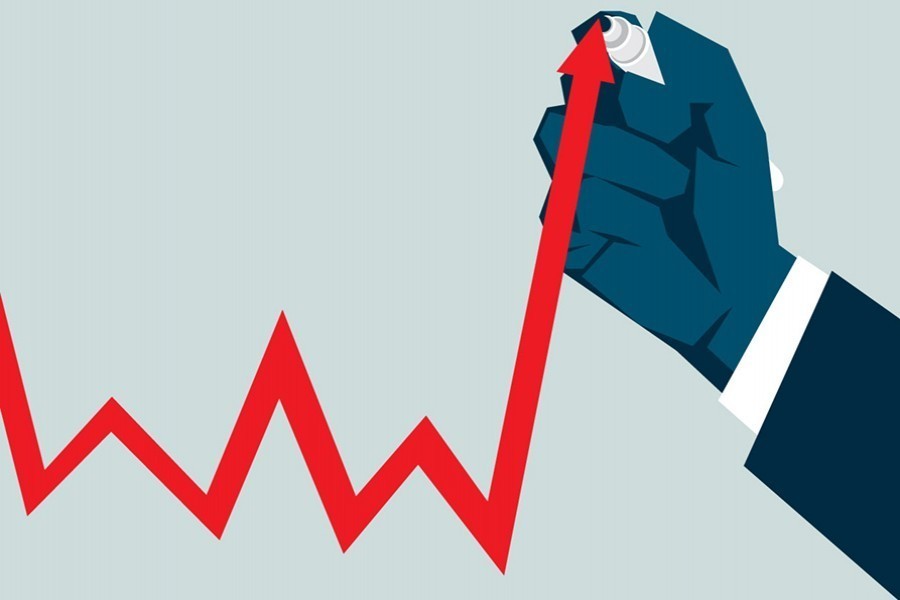Newlywed couple Setu Yasmin and Md Wahid had been looking for some fine-cut mutton at the Mirpur Shah Ali Market the day before New Year’s Eve for a small soiree they were planning to organise for friends and families to celebrate 2023.
The reality hit them hard after some hours of frantic search as it appeared they could not afford mutton anymore as the price range they found - Tk 950 to Tk 1,050 - from several butchers was way above their budget, reports bdnews24.com.
Both Setu and Wahid were frustrated but not too surprised. Since the couple tied the knot earlier this year, they had been struggling with the cost of living crisis and do not believe things will turn for the better in the coming year.
“Our expectations are quite low as it is because we know prices [of commodities] keep soaring but they never go down,” Setu said.
Md Alam, the butcher who was standing nearby the couple, had a similar frustrating tone as his sale went down quite significantly in 2022 due to soaring prices of meat.
“It was a bad year [2022] for me. If a kg of meat [mutton] goes above Tk 1,000, people won’t be able to afford it, would they? Don’t think 2023 will be any different.”
Setu, Wahid and Alam represent millions of Bangladeshis who have been struggling with the cost of living crises in 2022, a period of deep collective economic anxiety.
Throughout the year, middle-class Bangladeshis were forced to cut their basic and discretionary spending as the cost of living crisis skyrocketed following the increase in fuel prices by the government.
Prices of almost all essential commodities have seen a steep rise throughout 2022.
The situation went so bad that authorities had to step in, especially the Directorate of National Consumer Rights Protection and Bangladesh Competition Commission.
While the directorate conducted futile vigilance in the grocery markets to keep the soaring price at bay, the commission took the most serious step as of yet, subpoenaed large wholesalers and distributors of essential commodities to justify the unusual rise of their products’ prices at a series of public hearings.
By the end of the year, however, it does not look like situations had improved a bit and with a projection of a recession in the coming year, things are unlikely to change.
Some forecasts show sky-high inflation will erode average real pay and cut living standards significantly next year, wiping out the growth of the previous decade.
SMALL RETAILERS UNDER MOUNTAINS OF DEBT
Some small retailers bdnews24.com interviewed for this article likened the year as one of the most disastrous they faced in decades as they had been struggling to cope with the unpredictable nature of the market.
As the wholesale price had soared, they were forced to invest almost double the capital. Retailers are forced to borrow to accumulate additional capital.
Spice seller Md Asaduzzaman at the Mirpur Shah Ali Market is one such retailer.
“I am buying materials at Tk 150-160 per kg which used to be Tk 100 even a year ago. However, my profit margins didn’t see a change. As a result, I had to borrow to find the additional capital from acquaintances and banks,” he said.
Padma Rice Agency’s proprietor Md Shariful Alam has a different theory.
He believes markets are being controlled by large cartels now and small retailers like him have been failing badly to compete with them, ending up not only under the microscopes of authorities, but also the thumb of lenders.
“No one wants to share my losses. If I try to sell my products at the same rate big retailers are offering, authorities show up and I am the one ending up with a large debt from banks in the end,” Shariful said.
NET CONSUMER SALES FELL DRASTICALLY
With the official inflation rate above eight percent by the end of the year, for the first time in a decade, households across Bangladesh have tightened their belts to accommodate the rising cost of weekly grocery runs with rent or mortgages and utility bills, prompting Prime Minister Sheikh Hasina repeatedly issued warnings of the economy facing a possible recession in 2023.
Dry fish trader Al-Hadis’s business remained sluggish throughout the year.
“Dry fish prices rose quite a bit. As a result, my regular buyers are buying less quantity than they used to,” he said.
Elderly sapling seller Abul Kalam hardly had any buyers in the second half of the year.
“The year started out great. By the end of it, however, I have no more customers,” he said.
Office worker Mostakur Rahman, who came to Mirpur’s Asian Market to buy groceries, was deeply saddened by the situation.
“I feel choked whenever I set foot in the market as the prices of most basic products are beyond my buying range. It’s been a horrible year for middle class people like me,” he said.
SIGNS OF POLITICAL INSTABILITY WORRY CONSUMERS, RETAILERS
Some of the consumers and retailers interviewed for this article had a different kind of worry about the upcoming year.
While sellers are worried that the supply chain will be severely disrupted if the political situations get more heated ahead of the general election, scheduled to take place by the end of 2023, consumers are worried that the prices of commodities may see another massive jump because of it.
Selim Ahmed, an onion wholesaler, said: "Businesses were bad due to COVID19 and the war [war in Ukraine] for the last two years. If political instability sets in in the coming year, businessmen like me will end up on the street.”
Amena Begum, a mother of two sons, said: "No matter who comes to power, their primary focus should be the welfare of the people of the country. Only then everything will go well.”


